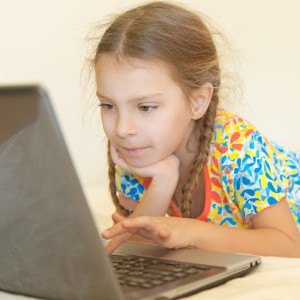One of the reasons the new primary computing curriculum is being introduced is to address the issue that far fewer girls than boys study computer science in further and higher education and are therefore under-represented in industry. There’s a perception that computer science is a bit of a boys subject and various laudable, although I feel somewhat patronising, efforts to ‘get girls coding’ usually take the form of designing activities that play to stereotypes: dressing up etc. I’ve been teaching primary computing for a long time now and I’ve yet to have a single girl not be engaged in my lessons; although I do accept that this could largely be influenced by the fact that it is me teaching them. And I’m about as girlie as you can get. It’s difficult to judge which question I get stopped and asked most about in school – ‘Are we doing computing today?’ or ‘Where did you get your shoes?’
I, like most people, am not a stereotype. I’m certainly not a stereotypical Computer Scientist. I’m a regular at the Dior counter, have a killer shoe collection, a degree in Computer Science, modelled in the past, have been a software developer, software project manager and am a primary school teacher. It’s true, women are under-represented in Computer Science: I was one of two women on my degree course and, later, frequently got mistaken for the tea lady at software design meetings by clients. But I’m far less concerned about whether girls go on to study computing further along the line or work in the industry than I am about enabling them to understand and fully participate in an increasingly digital world. So, how can we ensure that girls enjoy and thrive in computing?
To me, it starts with creative teaching. Don’t assume you need to design special activities for girls. In my scheme, I give the children the freedom to express themselves using a range of different technologies and tools – which is what all that Digital Literacy stuff is about in the new curriculum. They have parameters within which to work in order to achieve the lesson objectives but how they demonstrate they have met them is open. This not only facilitates and encourages creativity, for both boys and girls, but also provides for differentiation. For some girls, this may well involve their developing a girl-meets-boy animation using a programming language or using HTML to put together a website about One Direction but certainly not for all and I’d be very concerned about any lessons or units that assume this is all girls are interested in.
The reason I like computing so much is because I like beauty and elegance. There is elegance in the process of creating algorithms and beauty in what they can produce when programmed. You might think that’s a nerdy thing to say from someone wearing bottle-top glasses with a sweatshirt tucked into his jeans but, maybe, not from me. It’s those stereotypes again.
Designing and writing software, creating mobile apps and websites, to me, is a creative process involving devising elegant solutions. I often say to the teachers I train that you can be a computer scientist and artistic. The team who developed Adobe Illustrator know about art; developers of Pixar animations are artists. Any application you use that allows you to be creative has been designed and developed by computer scientists who applied their own creativity to facilitate yours.
If we devise schemes that allow both boys and girls to see computing as an art as well as a science it will, in my view, undoubtedly lead to more girls engaging with the subject as they progress in their education and, ultimately, lead to a better gender balance in industry. There is no need to pander to stereotypes in your curriculum and your lessons. We girls are not complicated. We do pretty well if you set us off in the right direction, don’t make assumptions or impose limits and give us a little creative licence.




